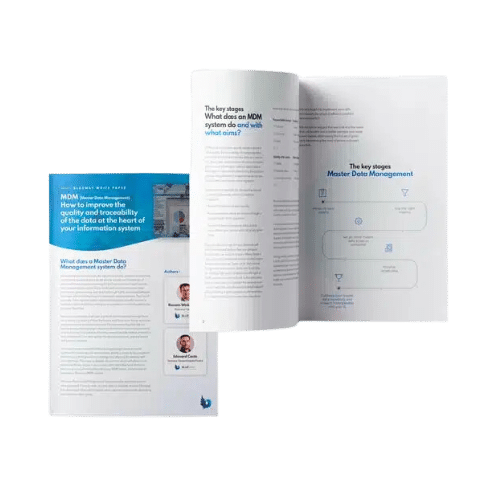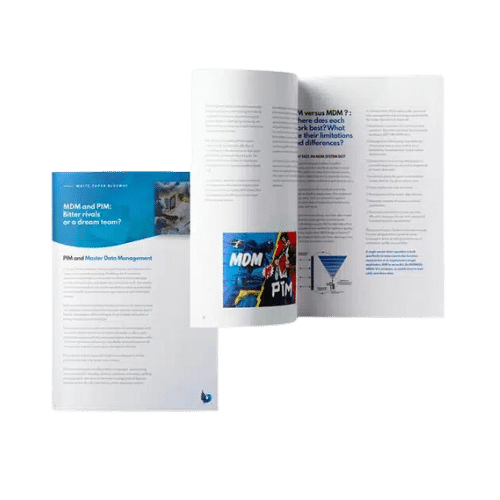Decision-makers often wish to put a data governance strategy in place. However, the next step is to determine how to implement such a strategy and which data governance toolkit to use. The functional rules, control over data traffic and the distribution of roles played by actual people are just some of the issues to be clarified through the adoption of an appropriate methodology and toolkit, culminating in effective operational data governance for your organisation.
What need is met by a data governance strategy?
Data governance is a cross-cutting approach, which consists of better understanding and standardising the use made of data by all stakeholders in an organisation. This improved understanding and standardisation are essential, to meet the needs of the functional business areas consuming the data, and achieve their objectives. But this is not all.
With the huge increase in volumes and the crucial requirement to protect data (security and integrity) , plus compliance with GDPR and any industry-specific regulations), setting up data governance is often no longer really an optional matter for businesses. Governance provides a data management framework, adding value and ultimately supporting better-informed decision making.

Master Data Management : data quality and traceability at the heart of your information system
The key areas and roles on which data governance is based
Governance must be developed along four main avenues to meet a company’s strategic and operational requirements:
Developing a data culture and key roles in the organisation
To enable all involved to better understand and play a part in the data governance process, it is essential to develop a data culture internally. To this end, members of staff will be trained, and project sponsors and key roles defined and assigned, adapting the organisation to best address your data issues.
Data standardisation and quality
It is essential to have quality rules, a data glossary and a single version of master data to ensure the whole organisation is working on the same basis.
Data movement
Once data has been evaluated, it is important to ensure it can be effectively conveyed to, and understood by, the business functions. Data governance entails proper control over data traffic, taking into due account the applications in place, the IS architecture, and business requirements.
Management throughout the lifecycle
Mapping and displaying the data lifecycle, from collection to consumption, maximises that data’s utility. Properly delimited processes and effective supervision ensure alignment and better management of the data lifecycle (data lineage, traceability, etc.).
In terms of human resources, data specialists can get involved at various stages to ensure that processing meets objectives and requirements, and fits with the organisation’s business activities. Such specialists include:
- The Data Owner: determines the actions to be taken on data within their functional scope, and takes a broader perspective on data and how it is used by the business.
- Data Steward: with operational responsibility for quality, they also ensure that data is properly understood by the business lines, so that it truly adds value and is usable.
- Data Architect: this data mapper helps to structure data to ensure a flawless fit with the information system. They also support and guide the company’s trajectory as regards data, and its implications in terms of the architecture.
Data experts have a vital role to play not only in quality assurance measures and the use made of data, but also in raising awareness and making data generally accessible to all functional areas.
More broadly, data experts endeavour to ensure the data fits with the organisation, which is a critical success factor for any data governance strategy.

MDM versus PIM: bitter rivals or a dream team ?
Blueway’s role in supporting your data governance strategy
Blueway offers a platform to meet these operational and technical implementation requirements, providing a number of integrated dovetailing solutions as regards the challenges of data governance. The platform is designed to address data management in the round, and ultimately to support your governance strategy.
The Data Governance module returns data users to the heart of data management, standardising and organising data through:
Data quality assurance
…to unify how all functional business areas understand data and increase their trust in it, by giving structure to processing (de-duplication, functional rules, transcoding, etc.)
Master data modelling
… to facilitate needs-based data structuring and architecture.
Control over access and roles
… to keep access to data secure, and ensure long-term security is maintained (permissions, event and role management)
Quality administration and coordination
… with quality monitoring and data lifecycle management that together maximise data experts’ value.
The Data Foundation module meanwhile works towards effective, controlled movement of data around the IS with:
Data collection and transport
Put a central application bus in place, through which all business applications are fed.
Data consumption rules
Configure how data is processed throughout its journey around the IS, including data transformation, enrichment, and functional rules.
Data distribution and exposure
Expose data effectively and govern how APIs are set up, regardless of your existing architecture.
Data traffic supervision
Monitor data traffic and quickly locate errors to ensure the integrity and smooth flow of data.
To delve deeper into data management, we can lastly look at the aspects of data exploitation and integration into business processes. The specific module, called Process Governance, offers process modelling, automation and coordination functions to further the business’ objectives, while making those processes more truly part of the IS.
When combined correctly, these solutions form a natural foundation for the data governance strategy, and accelerate its implementation for your whole organisation.

Want to discuss your data management challenges with an expert?



